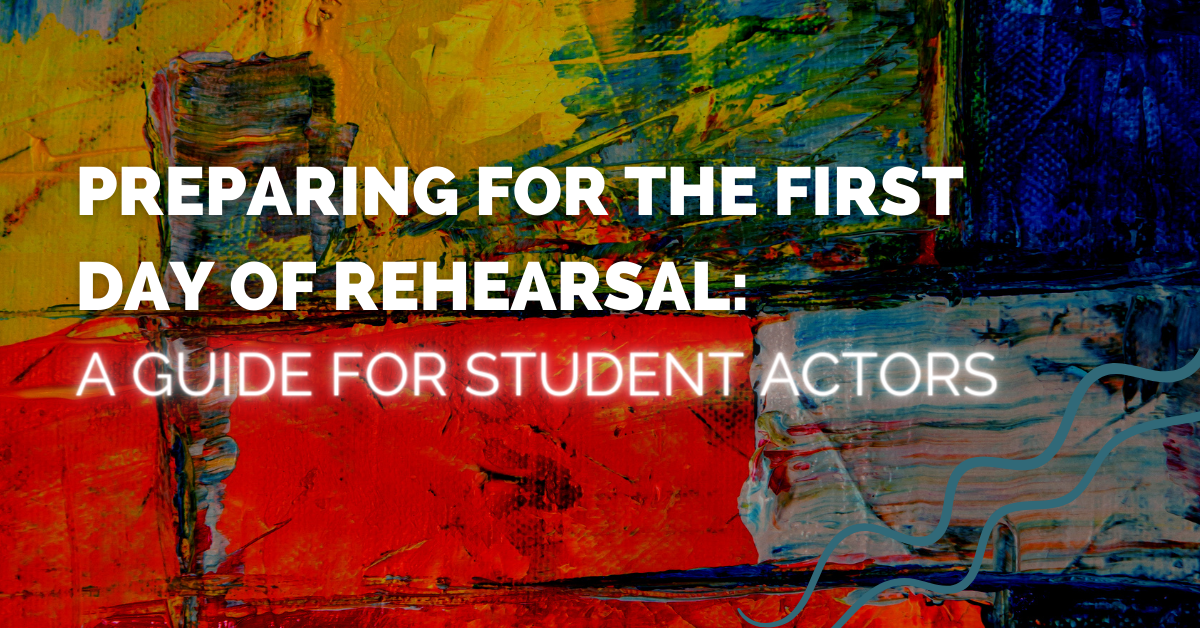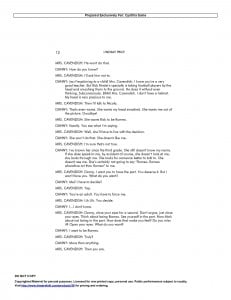Preparing for the First Day of Rehearsal – A Guide for Student Actors
Don’t miss the printable version of this post at the end of the article!
Introduction
The first day of play rehearsal can be nerve-wracking, especially for beginning actors. But it doesn’t have to be. Just as with any new experience, preparation is the key to success. Here’s a guide on how to get yourself ready for the first day.
Homework
There is quite a bit you can do on your own to get yourself ready for the first day. These steps will get you familiar with the play and your character.
Read the Play
The first thing to do is a straight “pleasure read.” Read the play purely for your own enjoyment, just as you would sit down and read a book. Don’t take notes, there will be lots of time for that later. Do your best to avoid focusing on your character (it’ll be very difficult). Your goal is to get a sense of how the play works as a whole.
Prepare Your Script
- Some actors cut up their scripts and paste each page on its own larger page like this:
- This is a great idea because it leaves space around the text for you to take notes.
- Highlight your lines, but just the text you speak. Don’t highlight the stage directions.
- Use Post-it tabs to mark the beginning of each scene you’re in (regular Post-its work fine for this, too.) Every second in rehearsal is valuable and the quicker you can find your place the better.
Do some Script Analysis
Next, it’s time to start thinking about how you’re going to build your character. You don’t have to be 100% there on the first day, but rehearsal will go much smoother if you take some time to get comfortable with your character beforehand. Your director will appreciate your efforts.
Here are four different approaches to script analysis to get you going. If you take the time to do them all, you’ll be more than ready to get going on the first day.
- Script Analysis for Actors – Five Steps to Building Your Foundation
- Script Analysis for Actors – Use Action Words
- Script Analysis for Actors – Relationships
- Script Analysis for Actors – Filling in the Gaps
Look at the Production Schedule
Assemble a list of all your commitments between now and opening night to bring with you to the first rehearsal.
If you’ve been given a production schedule, go through it thoroughly and compare it with your own schedule. Make note of any potential conflicts with your other commitments. If any of your commitments conflict with a performance or any rehearsal in the week before opening night, contact your director or stage manager immediately.
The First Rehearsal
The day is here and you’ve done your homework. You’re ready to start!
Be early
Be early for every rehearsal and be ready to work at the rehearsal start time. There’s a saying in theatre – Ten minutes early is on time. On time is late. Rehearsal time is valuable time and if you’re late, you’re not only cheating yourself of time to make your performance the best it can be, you’re also robbing everyone else who showed up on time.
Remove all distractions
Turn off your phone, iPad, or whatever other communication device you happen to have. Leave your problems and outside distractions at the door. Do a light warm-up on your own (even if your director starts with a company warm-up). Do some light stretching, some simple vocal exercises, whatever it takes to get you ready.
Things to bring on the first day
All of your contact information.
Bring your calendar and a full list of any potential conflicts. This isn’t a time to fudge the truth or hope that conflicts will work themselves out on their own. It’s absolutely vital that everyone know when you’re available and when you’re not.
Wear loose comfortable clothes and comfortable shoes that don’t restrict your movement.
Your script. Seems obvious, but some people don’t think they need their script on the first day. They’re wrong. You always need your script.
Your script analysis notes. Some actors keep all their notes in their script, others keep them in a separate notebook or tablet. Bring all of your notes with you no matter how you store them.
Pencils with erasers. Never write blocking or any other notes in pen. Everything will change, especially in the early stages of rehearsal. Things will change over and over again. Be prepared to take notes and to erase them. Notice that it’s pencil s – plural. You’ll misplace your pencil, you’ll outright lose it, you’ll loan it to a friend who never returns it.
Highlighter. You’ll use it to highlight any lines you missed when you highlighted your script as well as any other important information you’re given.
Ideas and energy. You get out of rehearsals what you put into them.
Questions. Are there parts of the script you don’t understand? Were you unsure about what direction you should take with your script analysis? Keep a question list in your script.
An open mind. If you’ve done your homework you’ll have formed some strong viewpoints about your character and the play. These views might conflict with the views of the director or your other actors. Keep your mind open to everyone’s ideas. This is a team effort and your play will probably become a balance of what everyone brings to the table. Note, though, that the director has the last call on everything.
Things to not worry about
Your lines. Be familiar enough with the script that you can make a little eye contact when you start blocking but don’t worry about being off book right away.
Making mistakes. Rehearsal as a place where mistakes are good. It’s a place to try things and fail. Aim to make mistakes in every rehearsal. If you get to the end of a rehearsal without making a mistake, it means you didn’t try anything new. Never stop trying new things. Never stop exploring.
Related Articles
The Drama Classroom Companion
by Lindsay Price & Kerry Hishon
The Drama Classroom Companion is filled with articles and exercises to build the skills needed for theatrical performance as well as real world skills like creative thinking, critical thinking, collaboration, and communication.
The Rehearsal Companion
by Kerry Hishon
You’ve chosen the play, paid the royalties, done the script analysis, held your auditions, and cast the show. Tomorrow is the first rehearsal. Are you ready? Really ready? The Rehearsal Companion can help!






